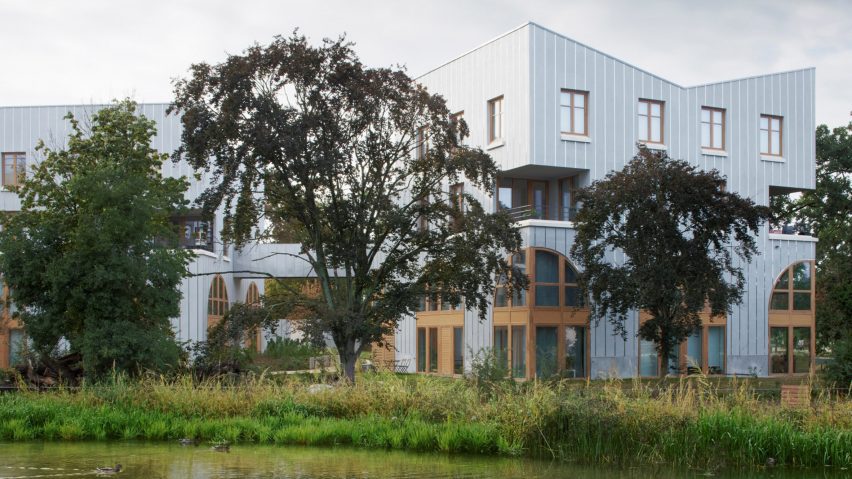The 19th-century villas in the suburbs of Paris informed the arched windows and sloping roofs of this social housing block in France, completed by local studio SOA Architectes.
SOA Architectes was tasked with creating 24 social housing units and two affordable units at Parc Princesse – the site of a former hospital in Vésinet that is being developed into housing and an urban park.
The studio drew from the historic villas found nearby to create a structure that would "stand out" while also respecting its parkland setting.
"The town of Vésinet includes numerous parks dotted with villas, most of them built in the 19th century," explained SOA Architectes.
"The styles are eclectic, readily combining architectural devices borrowed from different eras," it continued.
"The watchword seems to have been expressive richness and the desire to stand out, [and] this double constraint constitutes a contradictory injunction: blend in and show yourself," it continued.
SOA Architectes divided the apartments across three volumes. To the west, the two smallest blocks sit at an angle on either side of a central circulation space and bike parking area topped by garden terraces.
To the northeast, the largest block connects to the central space via a small link bridge on the first floor, with an angled spiral staircase leading back down to ground level.
A landscaped path provides routes between and around each of these blocks and to the adjacent housing developments on the site.
SOA Architectes decided to break up the mass of the building in an effort to "not monopolise the park".
The apartments themselves are organised as duplexes, allowing for the creation of double-height living rooms on the ground floor that overlook the park through large, wood-framed arches.
Balconies cut out of the corners of each block create covered terraces for the upper levels of the apartments.
"To disappear at eye level and blend into the plant masses, the bases of the buildings are treated with large double-height arches," explained SOA Architectes.
"Their proportion reflects the size and shape of the gaps left between the trees."
Externally, a cladding of concrete panels is enlivened by thin metallic strips, intended to help break down the mass of each of the apartment blocks by reflecting the trees and sky.
"This hybrid material, both concrete and evanescent, anchors the construction as much as it melts it in the kinetic reflection of its reflective lines," said the studio
Each block is topped by a butterfly roof, another strategy to reduce the visual dominance of the buildings and "increase the feeling of intimacy".
Previous projects by SOA Architectes include the 21-storey mixed use Aya Tower in Beirut, for which the studio drew on traditional Arabian houses.
Other social housing blocks featured on Dezeen include La Brea Affordable Housing in West Hollywood and The Caserne de Reuilly in Paris, which were featured as part of Dezeen's Social Housing Revival series.
The photography is by Camille Gharbi.

